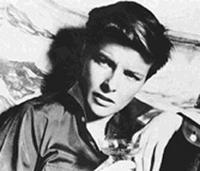
Sylvia Scarlett is a 1935 disastrous gem of a movie. Directed by George Cukor, Hollywood’s only out gay studio director of the era, the film featured Katharine Hepburn in drag as young Sylvia/Sylvester Scarlett, a youth who follows her ne’er-do-well widowed father on an adventure in pulling small-time cons. To join him rather than be left behind, Sylvia becomes Sylvester, and a merry time is had by all, especially their newfound pal Jimmy Monkley (played with cockney fabulousness by Cary Grant). Merry, that is, until an alcoholic jealous fit leads to the death of Papa Henry Scarlett (rendered with morose charm by Wales’ own Edmund Gwenn, whom you should know as Kris Kringle from Miracle on 34th Street, Captain Albert Wiles in Hitchcock’s The Trouble with Harry, or 80-odd other character roles). But the comedy ending is rescued when our heroine/hero falls for the womanizing artist Michael Fane (giddily portrayed by a handsomely wavy-haired Brian Aherne). Fane finds “something queer” in young Master Scarlett, but likes the lad. When he learns that he is really a she, he is at first astonished by this “crowing hen,” this “freak of nature”; however, bewilderment soon turns to love. The film ends with Sylvia redonning boy’s garb and escaping to happiness on a train with Fane while the jilted Jimmy Monkley runs off with the entirely bitchy and spoiled former object of Fane’s affection, Lily.
What I most love about Sylvia Scarlett is, of course, its gender transgressiveness. There are countless superb moments, from Hepburn in drag to Fane’s “queer” line to Monkley telling the young person he thinks is a boy that they should bunk together because Sylvester will make a “proper little hot water bottle” to the scene in which Henry’s trollop of a girlfriend, the maid Maudie Tilt (deliciously overplayed by Dennie Moore) makes a pass at Sylvester (after drawing a Ronald Coleman moustache on him) and we actually see the kiss. Better, I would argue that the film goes even further. As I read it, the fey Fane cannot feign his own queer desires: it is obvious at film’s end that what he most loves about Sylvia is that she is also Sylvester.
It is not easy to find a copy of this box office super-flop. And it’s not without its clunky moments. But if you like camp and genderbending and can buy, rent, or borrow someone’s videotape (the DVD’s only out in England), you’ll be glad you did.


1 comment:
Boy, is this a rich subject for the Gender class....
Post a Comment